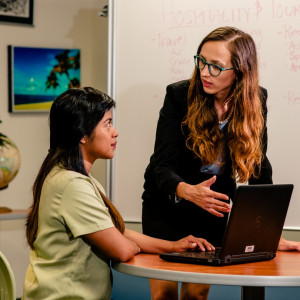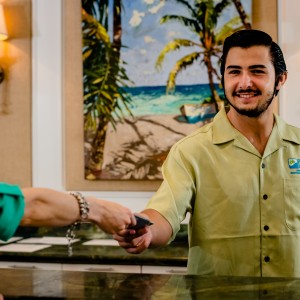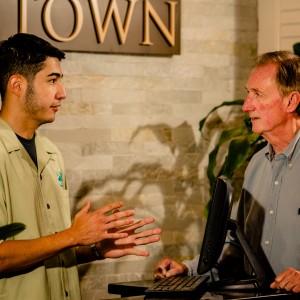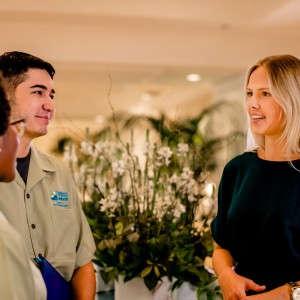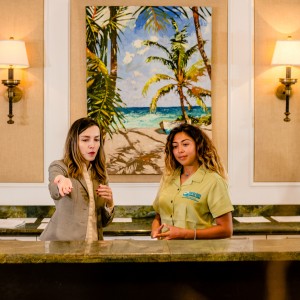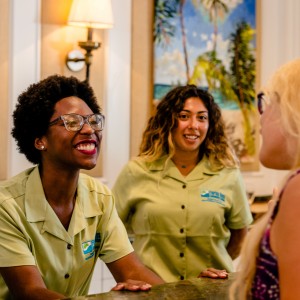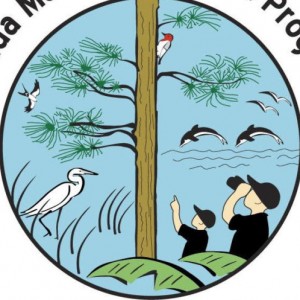Where better to study the industry of travel, leisure, lodging, and accommodations than the tourist mecca of the Florida Keys? The College of the Florida Keys is proud to offer degrees, certificates, and courses to prepare you—and help you advance—in a variety of careers within the hospitality, tourism and culinary fields.
Employment of hospitality and tourism professionals is expected to grow well into the future. Job seekers can expect strong competition for the best jobs. According to the U.S. Department of Labor, applicants with a college degree in hospitality are expected to have the best career opportunities.
In CFK’s industry-endorsed programs, coursework is enhanced by real-world experience gained through internships at some of the most respected hotels, resorts, restaurants, and dining establishments in the Florida Keys. As an added benefit, certifications through the American Hotel and Lodging Association are integrated into the course curriculum—making each class immediately valuable.
The programs and certificates listed below are only a guide. Following these tracks does not guarantee admission into a university. Course requirements may change each year. Some courses are offered night/online only every other year. You are responsible and encouraged to work closely with your advisor.
Land a top job or advance in your career by earning a Bachelor of Applied Science in Supervision and Management (BAS-SM) at The College of the Florida Keys. The baccalaureate degree is designed to prepare graduates to lead and succeed in a wide range of jobs in industries in the public, private, and non-profit sectors.
This program prepares students for employment in management positions in the hospitality industry and/or to provide supplemental training for persons previously or currently employed in these occupations. The hospitality industry as addressed in this program includes the hotel, motel, bed and breakfast, resort, club, marina, and other lodging organizations.
This technical certificate is a part of the Hospitality and Ecotourism Management AS Degree program and is designed to prepare students for immediate employment in the hospitality industry in the guest services area of hotels, resorts, and other hospitality and ecotourism related sites.
This technical certificate is a part of the Hospitality and Ecotourism Management AS Degree program and is designed to prepare students for immediate employment in the hospitality industry in the lodging and guest services area of hotels, resorts, and other hospitality and ecotourism related sites.
This technical certificate is a part of the Hospitality and Ecotourism Management AS Degree program and is designed to prepare students for immediate employment in the hospitality industry in the guest services area of hotels, resorts, and other hospitality and ecotourism related sites. The content includes but is not limited to coursework that prepares students for employment as supervisors and managers in the hotel/motel sectors of the hospitality industry.
This technical certificate is a part of the Hospitality and Ecotourism Management AS Degree program and is designed to prepare students for immediate employment in the hospitality industry in the guest services area of hotels, resorts, and other hospitality and ecotourism related sites. The content includes but is not limited to employability and customer service skills, marketing techniques in the hospitality industry, laws that affect the hospitality industry, and management operations for hotels.
Through a partnership with the University of Florida’s Institute for Food and Agriculture Sciences (UF-IFAS), CFK students in “OCB 2071: Marine Ecology for Tourism Professionals” will have the opportunity to become certified as a “Florida Master Naturalist in Coastal Systems.” The course, which is a program requirement, provides classroom and field instruction on general ecology, habitats, vegetation types, wildlife, and conservation issues of Coastal Systems in Florida. The course also addresses society’s role in coastal areas, develops naturalist interpretation skills, and discusses environmental ethics.
